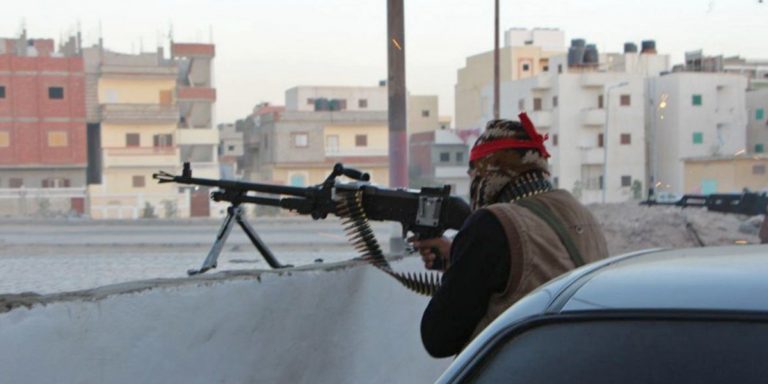INTELBRIEF
October 17, 2018
IntelBrief: The Forgotten Affiliate: The Islamic State in the Sinai

- Although it receives less attention than the so-called Islamic State or IS franchise groups in places like Libya and Afghanistan, the IS affiliate in Egypt’s Sinai Peninsula poses a major threat to regional stability.
- Despite boasting the Arab world’s largest conventional ground force, the Egyptian military has struggled to contain the insurgency, with its heavy-handed approach often generating significant opposition from the local population.
- Egypt has been so desperate to quell the insurgency that the Sisi government has turned to the Israelis for help, with Israel providing assistance through air power directed against the militants.
- The insurgency is evolving and spreading beyond the Sinai, into different parts of Egypt, includingthe Western Desert, Upper Egypt, and Greater Cairo.
.
Earlier this year, the Egyptian military launched Operation Sinai 2018 to clear its territory of militants and insurgents seeking sanctuary and safe haven. Within the past few weeks, Egypt’s army claims to have killed dozens of fighters from the so-called Islamic State’s affiliate branch in the Sinai. Considered one of the world’s most lawless areas, the Sinai Peninsula is characterized by harsh terrain and a Bedouin culture that is nomadic and fiercely anti-authoritarian. The dedicated IS franchise group in the Sinai continues to gather momentum, particularly in the face of the ineptitude of Egyptian security forces. IS-affiliated militants have pursued a hybrid strategy of attacking both Egyptian security forces and civilian non-combatants, the latter part of the strategy introducing a highly sectarian dimension to the conflict.
IS-affiliated fighters in the Sinai regularly clash with Egyptian security forces and have launched attacks over the past several years in which hundreds of Egyptian troops have been killed. IS’s Sinai franchise has also demonstrated a penchant for conducting spectacular attacks, evidenced by the downing of Metrojet Flight 9268, when a bomb killed all 224 people on board an airliner destined for St. Petersburg, Russia. Moreover, the group has launched attacks against Coptic Christian churches and fired rockets into Israel. But the government’s response to the insurgency has failed to take account of civilian ‘hearts and minds.’ An estimated 20,000 families have been forced to flee their homes in the northern Sinai, and area that has historically been fertile soil for the spread of terrorism, as the government provides few, if any, services to the population, and economic conditions are austere. Moreover, the Sinai’s itinerant Bedouin population has long operated with autonomy, and sometimes see it as in their best interest to cooperate with Islamist militants.
By regional standards, Cairo maintains a robust conventional military, although as the bloody insurgency in the Sinai has proven, the Egyptian army’s counterinsurgency capabilities leave a lot to be desired. Egypt’s failure to combat IS’s Sinai affiliate has afforded the latter with the space to develop into a highly capable franchise group. The Sisi government’s approach to counterinsurgency has been both short-sighted and counterproductive, leading the population of the Sinai to support the terrorists. Over the past several years, the operational tempo of terrorist attacks seems to have increased in both frequency and intensity. The insurgency is evolving and spreading beyond the Sinai, into different parts of Egypt, includingthe Western Desert, Upper Egypt, and Greater Cairo. Attempts by the Egyptian military to combat IS militants in northern Sinai have not only failed to quell the insurgency, but the use of ‘scorched earth’ tactics has alienated the local population, which was never fond of the government to begin with.
IS’s Sinai affiliate has also escalated the conflict beyond Egypt’s borders, broadening its targets by declaring war on the Palestinian militant group Hamas. In turn, this has sparked fears that IS could attempt to move into Gaza, bringing its fighters even closer to the Israeli border. Israel’s concerns are warranted, as the Sinai has traditionally been an anarchic region and one which is geographically ideal for terrorists and insurgents, especially given its proximity to the Jewish State. The Egyptians have struggled so mightily to contain the insurgency that they have turned to Israel for help, relying on the Israelis to wage a covert air campaign over the past two years, targeting militants with airpower and conducting intelligence, surveillance, and reconnaissance with unmanned aerial vehicles. In clear evidence of warming relations between Cairo and Jerusalem, these operations were specifically requested by Sisi’s top military leadership, signaling a level of desperation previously unseen in what has heretofore been exclusively a domestic issue for Egypt.
.
For tailored research and analysis, please contact: info@thesoufancenter.org
[video width="960" height="540" mp4="https://thesoufancenter.org/wp-content/uploads/2018/10/IB-1017.mp4" poster="https://thesoufancenter.org/wp-content/uploads/2018/10/AP_17011512360655-copy.jpg"][/video]